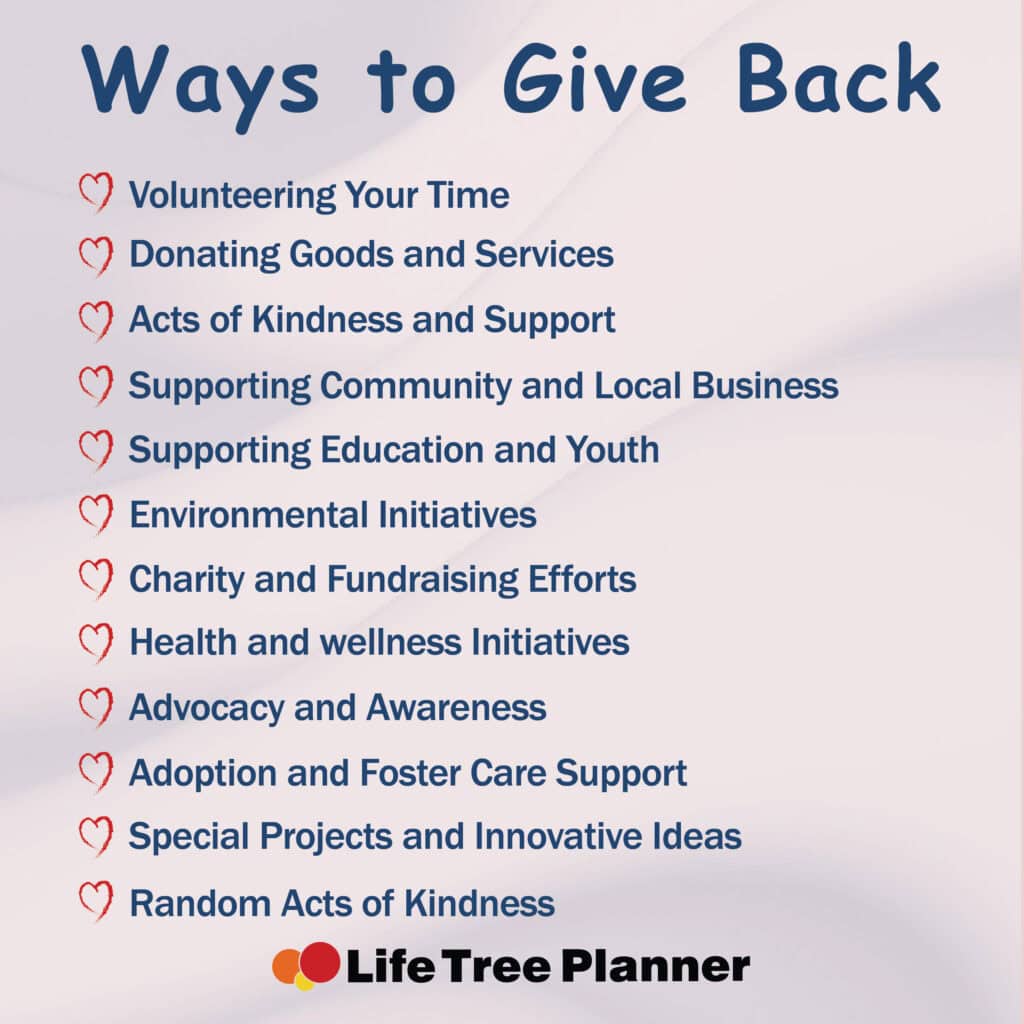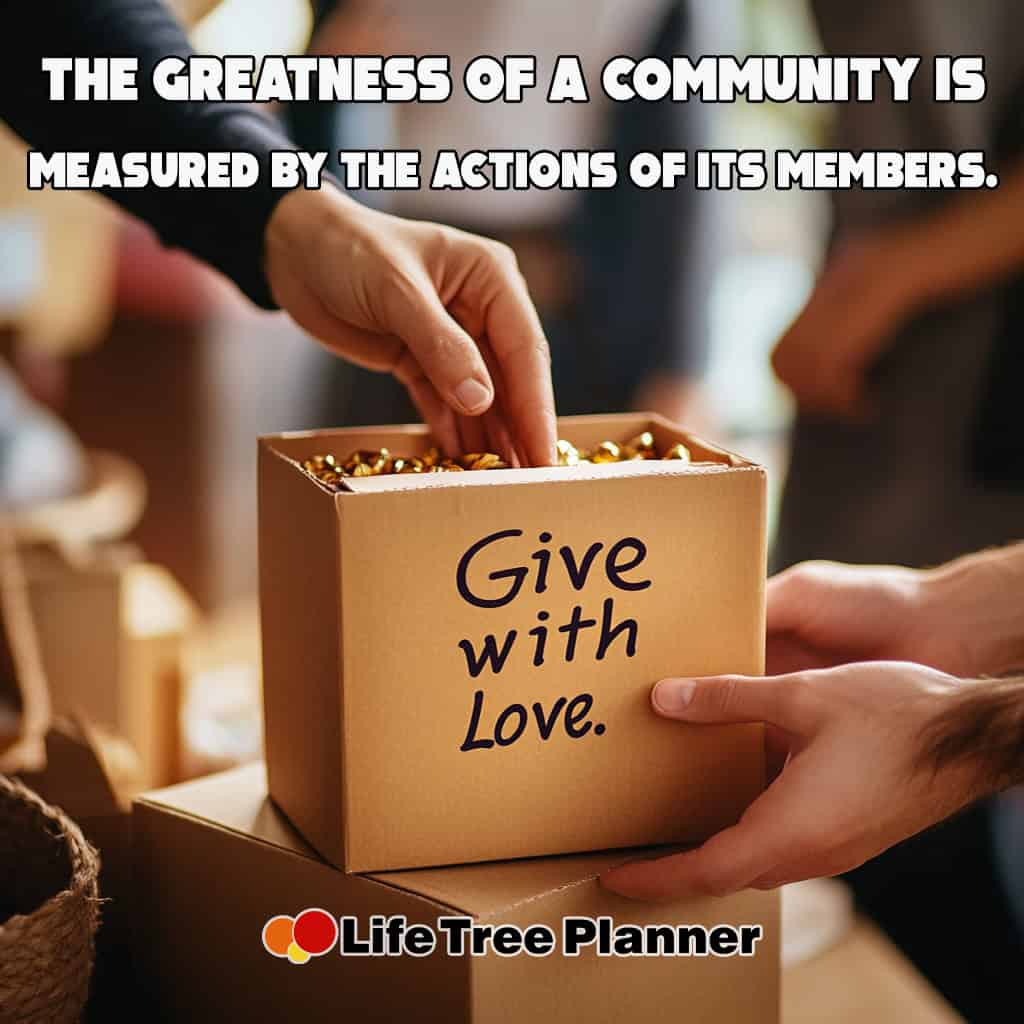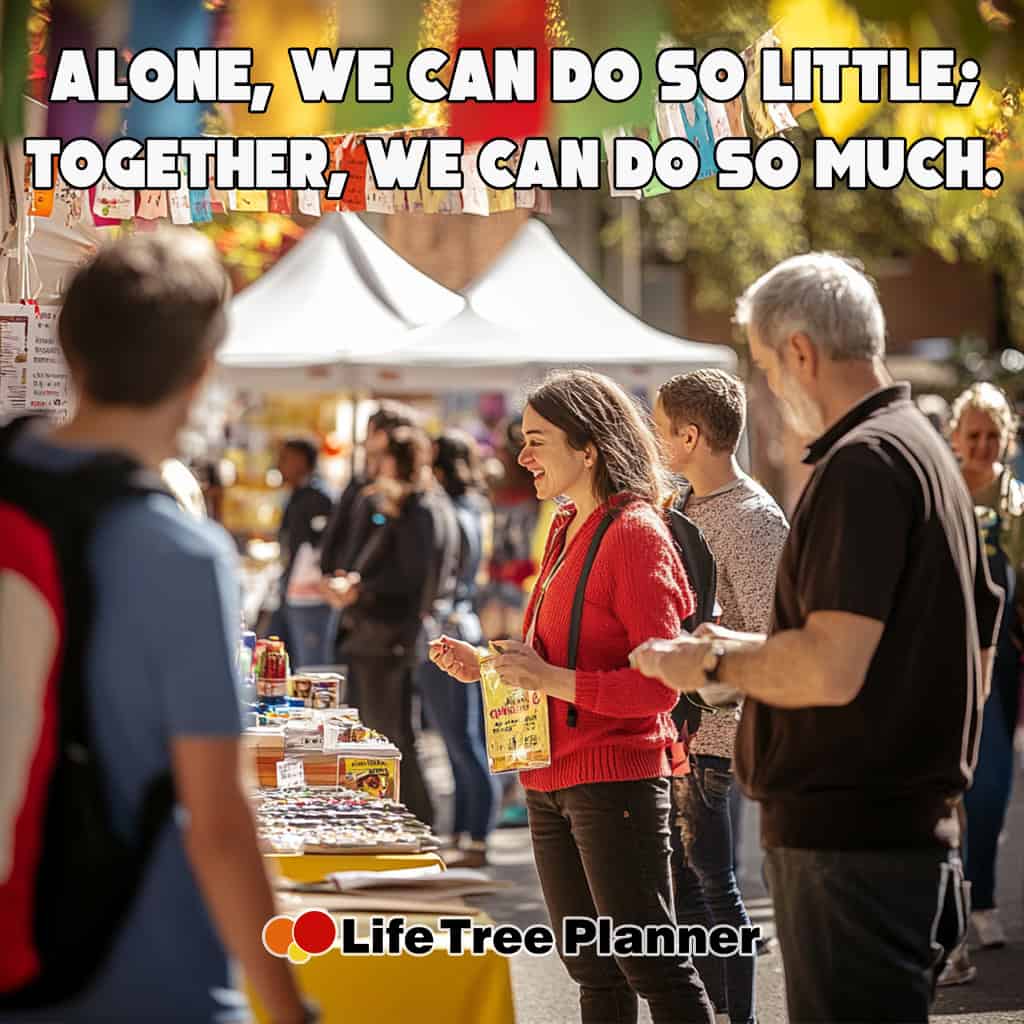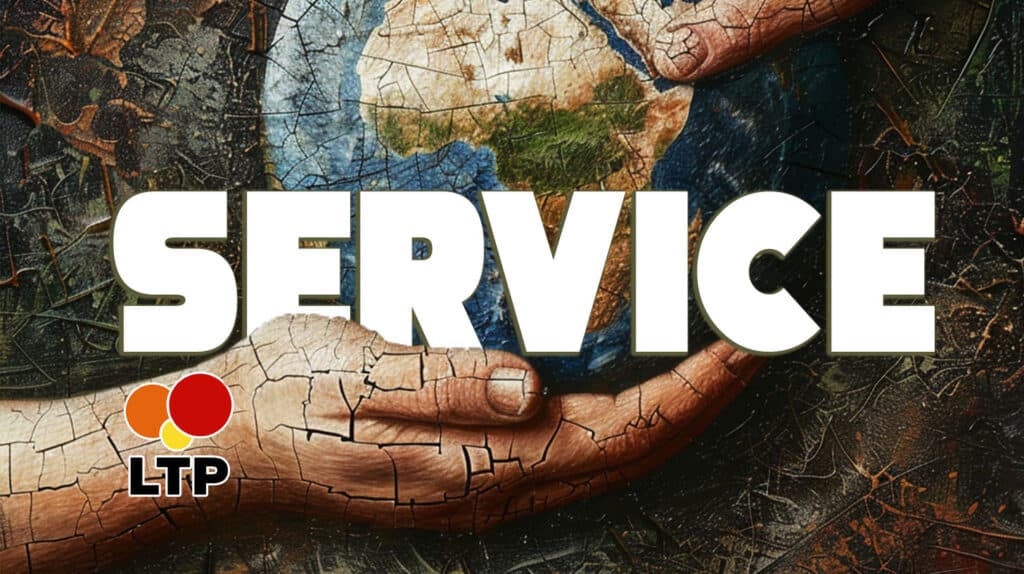

Have you ever felt like your small acts of kindness don’t make a difference in the grand scheme of things? What if those small actions could inspire a ripple effect, changing lives and transforming communities?
As someone who cares about making a positive impact, you know the power of giving. You’ve probably wondered how you can contribute more effectively, and if your efforts are truly making a difference. You’re not alone in feeling this way. Many of us share the desire to make the world a better place but are unsure where to start or how to make our actions count.
At Life Tree Planner, we understand the power and potential of charity and acts of service. With years of experience in driving impactful charitable initiatives, we’ve seen firsthand how even the smallest act of kindness can spark a wave of change. We’re here to guide you in harnessing your compassion and channeling it into meaningful, transformative actions.
- 1. The Ripple Effect of Charity
- 2. Understanding the Essence of Charity
- 3. The Impact of Selfless Giving
- 4. Beyond Monetary Donations: Acts of Service
- 5. Philosophical Aspects of Charity and Service
- 6. Psychological Aspects of Charity
- 7. Teaching Charity to the Next Generation
- 8. Keeping the Spirit of Charity Alive
- 120 Ways to Give Back
- 1. Volunteering Your Time
- 2. Donating Goods and Services
- 3. Acts of Kindness and Support
- 4. Supporting Community and Local Businesses
- 5. Supporting Education and Youth
- 6. Environmental Initiatives
- 7. Charity and Fundraising Efforts
- 8. Health and Wellness Initiatives
- 9. Advocacy and Awareness
- 10. Adoption and Foster Care Support
- 11. Special Projects and Innovative Ideas
- 12. Random Acts of Kindness
- Charity: A Recap
In this article, we will explore:

- How even small acts of charity can create a powerful ripple effect
- Understanding the core elements of charity and their impact
- The personal and community benefits of selfless giving
- Practical ways to incorporate acts of service into your daily life
- Teaching the next generation the importance of charity
Are you ready to make a real difference in the world? Keep reading to discover how you can use the power of giving to inspire change and make a lasting impact.
By following our guidance and following the principles of charity and service, you will find fulfillment, strengthen your community, and contribute to a world where everyone has the opportunity to thrive. Imagine the impact you could make, not just today, but for generations to come.
And if you’re looking for even more inspiration, be sure to check out our comprehensive list of 120 Ways to Give Back at the end of this article.
1. The Ripple Effect of Charity

Charity goes beyond a simple gesture—it’s a powerful force capable of transforming the world. It’s essential to recognize that acts of charity aren’t restricted to grand or large-scale efforts. Even the smallest acts of kindness can deeply touch someone’s life.
A warm smile, a listening ear, or offering a helping hand to a stranger can create a significant impact. These small acts of generosity can lift someone’s spirits, renew their faith in humanity, and show them they are not facing their challenges alone. When people unite for a shared cause, the resulting impact can be truly remarkable.
4 Ways to Show the Power of Acts of Charity
- Brings Communities Together: In times of crisis, such as natural disasters, communities rally to provide immediate assistance, restoring hope and rebuilding lives.
- Inspires Others to Act: Witnessing acts of charity can ignite a spark in others to do the same, creating a positive cycle of giving.
- Creates Long-Term Impact: Acts of charity address both immediate needs and systemic issues, from rebuilding homes to funding education.
- Helps a Sense of Belonging: Acts of service connect people, building stronger, more compassionate communities.
Checklist for Getting Started with Charity
- Identify causes that resonate with you personally.
- Start small—every action counts, whether it’s donating a meal or volunteering an hour.
- Collaborate with others to amplify your impact through community events or group initiatives.
Examples of Charity in Action
- A community uniting to provide relief after a natural disaster.
- A single blood donation inspiring a community blood drive, ultimately saving countless lives.
See also Raise Money for Charity: 5 Creative Ideas to Inspire Giving
2. Understanding the Essence of Charity

3 Core Elements of Charity
At its core, charity is rooted in empathy and compassion. It’s about helping others without expecting anything in return and addressing the root causes of societal issues rather than just alleviating symptoms.
- Empathy and Connection: Charity allows us to connect with others on a deeper level, understanding their struggles and responding with compassion.
- Inclusivity in Giving: Charity is not limited to the wealthy; everyone can contribute in their own way, whether by offering time, skills, or emotional support.
- Addressing Root Causes: While immediate relief is crucial, charity also involves advocating for long-term solutions that tackle the underlying issues.
Checklist for Effective Charity
- Research and vet organizations to ensure your contributions are used effectively.
- Volunteer for hands-on involvement to witness the direct impact of your actions.
- Advocate for policy changes that address systemic problems in society.
Examples
- Volunteers spending time with the elderly in nursing homes, providing companionship and emotional support.
- Charitable organizations working to break the cycle of poverty through education scholarships for underprivileged students.
3. The Impact of Selfless Giving

5 Benefits of Selfless Giving
Selfless giving involves offering help, support, or resources without expecting anything in return. This altruistic approach not only benefits those in need but also profoundly impacts the giver.
- Enhances Personal Growth and Fulfillment: Engaging in selfless giving helps empathy, compassion, and personal satisfaction. By stepping outside our comfort zones, we gain new perspectives and experiences.
- Builds Stronger Communities: When individuals give selflessly, they create bonds that strengthen community ties and provide support networks for those facing challenges.
- Promotes Mental Wellness: Acts of giving release endorphins, often referred to as the brain’s “feel-good” chemicals, which boost mood and reduce stress levels.
- Creates a Ripple Effect: Small acts, like donating a meal or lending a helping hand, inspire others to do the same, creating a chain reaction of kindness.
- Brings Gratitude: Giving helps us recognize the blessings in our own lives and cultivates a sense of appreciation.
Tips for Selfless Giving
- Volunteer at shelters, food banks, or community centers to directly impact those in need.
- Offer your professional skills pro bono, such as providing legal advice, tutoring, or creative services to nonprofits.
- Incorporate small acts of kindness daily, like buying coffee for a stranger or helping a neighbor with chores.
Examples
- A community food drive that not only feeds the hungry but also brings neighbors closer together.
- Organizing events like clean-up drives or clothing donations that directly address community needs.
4. Beyond Monetary Donations: Acts of Service

4 Ways to Make a Difference Through Service
Charity isn’t limited to financial contributions. Volunteering your time, sharing your expertise, and engaging in small acts of kindness can be just as impactful, if not more.
- Volunteering Time: Whether it’s a few hours a week or a long-term commitment, volunteering allows you to engage directly with those you’re helping.
- Sharing Skills and Expertise: Use your skills to support charities, such as offering free graphic design, legal advice, or mentoring.
- Donating Goods or Services: Donating unused items like clothes, books, or household goods can bring significant improvements to someone’s life.
- Acts of Kindness: Simple gestures like holding the door open, offering a smile, or assisting a stranger can brighten someone’s day.
Checklist: Ways to Serve
- Research local volunteer opportunities and choose a cause that resonates with you.
- Regularly declutter your home and donate usable items to shelters or charities.
- Look for opportunities to use your skills to benefit others, such as mentoring or providing free services.
Examples
- A lawyer offering free legal consultations to low-income families.
- A graphic designer creating promotional materials for a non-profit organization.
- Individuals hosting free workshops or tutoring sessions for students from disadvantaged backgrounds.
5. Philosophical Aspects of Charity and Service

The Deeper Meaning Behind Acts of Charity
Charity is not just an action but a philosophy of life that emphasizes interconnectedness and the moral duty to help others. It’s an expression of our shared humanity and a step toward a more compassionate world.
- Interconnectedness: Recognizing that our actions impact others, charity is a way to build a more empathetic society.
- Altruism as Moral Duty: Many philosophical traditions emphasize giving as a fundamental moral obligation.
- The “Pay It Forward” Ethic: Acts of kindness inspire others to do the same, creating a chain of goodwill that extends far beyond the initial act.
Philosophical Reflections
- Charity challenges us to consider how we can contribute to a more just and equitable world.
- Through acts of service, we fulfill a moral duty that transcends cultural and societal boundaries.
6. Psychological Aspects of Charity

3 Psychological Benefits of Charity
Charity doesn’t just benefit those receiving aid; it also profoundly impacts the giver’s mental and emotional well-being, having a sense of purpose and connection.
- Boosts Happiness and Reduces Stress: Helping others triggers the release of endorphins, which improve mood and lower anxiety.
- Increases Feelings of Connection and Purpose: Giving fosters a sense of belonging and reminds us of our shared humanity.
- Encourages Gratitude: Reflecting on what we have while giving to others enhances our appreciation for our own lives.
Checklist for Mental Well-being Through Charity
- Engage in regular acts of giving, whether volunteering, donating, or offering support.
- Reflect on the impact your actions have on others and yourself.
- Balance giving with self-care to prevent burnout and maintain your well-being.
Examples
- Volunteering at a local shelter can lead to increased life satisfaction and a stronger sense of community.
- Acts like mentoring a child or helping a struggling neighbor can bring a profound sense of fulfillment.
See also Books about Charity: 10 Insightful Must-Reads on Philanthropy
7. Teaching Charity to the Next Generation

How to Raise Compassionate Future Leaders
Instilling values of charity in children makes empathy, gratitude, and civic responsibilities, setting them up to be compassionate, engaged citizens.
- Fosters Empathy and Compassion: Children learn to understand and care for others, developing into kind individuals.
- Teaches Gratitude and Generosity: Kids appreciate what they have and become more willing to share with those in need.
- Promotes Civic Engagement: Involvement in charity teaches kids about community, responsibility, and making a positive impact.
Tip for Parents
- Volunteer as a family: Activities like food drives or park clean-ups teach kids the value of giving.
Discuss the impact of charity with your children: Explain how their actions help others

Encourage small, daily acts of kindness, like donating toys or helping a neighbor.
Examples
- A child setting up a lemonade stand to raise funds for a local charity.
- Families volunteering together at a food bank, teaching kids the importance of community service.
8. Keeping the Spirit of Charity Alive

5 Tips to Sustain Charitable Efforts
Maintaining a charitable spirit requires dedication, creativity, and collaboration. By setting goals and celebrating milestones, you can keep the momentum going.
- Set Clear Goals and Objectives: Define what you hope to achieve with your charitable actions.
- Find Your Passion: Align your efforts with causes you deeply care about.
- Celebrate Small Victories: Acknowledge progress, no matter how small, to stay motivated.
- Collaborate with Like-Minded Individuals: Join forces with others to enhance your impact.
- Embrace Creativity and Adapt: Explore new ways to give, like virtual fundraisers or community challenges.
Examples
- Hosting a virtual fundraiser to support a cause during challenging times.
- Organizing a local clean-up or awareness campaign to mobilize your community.
120 Ways to Give Back

1. Volunteering Your Time
- Volunteer at a local food bank or soup kitchen.
- Help clean up a local park or beach.
- Spend time reading to children at a community center or library.
- Visit residents in a nursing home or assisted living facility.
- Volunteer to tutor students in subjects you are skilled in.
- Help out at a local animal shelter by walking dogs or cleaning cages.
- Organize or participate in a neighborhood clean-up day.
- Volunteer to coach a youth sports team.
- Assist in organizing a charity run or walk.
- Help at a community garden to grow food for those in need.
2. Donating Goods and Services
- Donate clothes you no longer wear to a local shelter or thrift store.
- Collect non-perishable food items and donate them to a food bank.
- Donate books to schools, libraries, or literacy programs.
- Gather and donate toiletries for shelters or crisis centers.
- Provide unused blankets and warm clothes to homeless shelters.
- Donate toys to children’s hospitals or community centers.
- Give gently used furniture to families in need.
- Offer your professional skills pro bono (e.g., legal advice, graphic design).
- Donate blood to a local blood bank.
- Collect and donate old eyeglasses to organizations that distribute them.
3. Acts of Kindness and Support
- Hold the door open for someone.
- Pay for the coffee or meal of the person behind you in line.
- Leave positive notes in library books or public places.
- Offer to help carry groceries for an elderly neighbor.
- Smile at people you pass by throughout your day.
- Spend time listening to a friend who needs support.
- Compliment a stranger to brighten their day.
- Write thank-you notes to teachers, healthcare workers, or public servants.
- Send a care package to someone in the military.
- Help a neighbor with yard work or snow shoveling.
4. Supporting Community and Local Businesses
- Shop at local farmers’ markets and small businesses.
- Donate to or participate in local charity auctions.
- Attend and support community events and fundraisers.
- Promote local businesses and charities on social media.
- Offer free workshops or classes in your area of expertise.
- Support local artists by buying their work or attending performances.
- Start or join a community watch program to help keep neighborhoods safe.
- Organize a block party to foster neighborhood connections.
- Create a “Little Free Library” in your neighborhood to share books.
- Host a bake sale with proceeds going to a local cause.
5. Supporting Education and Youth
- Donate school supplies to underprivileged schools.
- Volunteer to read or mentor at a local school.
- Offer scholarships for students in your community.
- Sponsor a child’s participation in sports or extracurricular activities.
- Organize a book drive for schools or literacy programs.
- Tutor students struggling with specific subjects.
- Help organize or coach a school debate or science club.
- Host career days or workshops for students to explore different fields.
- Sponsor or participate in after-school programs.
- Provide internship opportunities for high school or college students.
6. Environmental Initiatives
- Plant trees in your community or participate in reforestation projects.
- Start a recycling program in your neighborhood or workplace.
- Reduce waste by organizing a community swap meet.
- Participate in Earth Day activities.
- Promote energy-saving practices and workshops.
- Organize a bike-to-work day to reduce carbon footprints.
- Support local farmers and sustainable agriculture practices.
- Set up a composting program in your community.
- Educate others about reducing plastic use and ocean conservation.
- Participate in or organize cleanups of rivers, lakes, or other natural areas.
7. Charity and Fundraising Efforts
- Organize a charity run or walkathon to raise funds for a cause.
- Host a charity dinner or gala.
- Set up a crowdfunding campaign for someone in need.
- Organize a bake sale or car wash with proceeds going to charity.
- Participate in or organize a charity auction.
- Donate part of your paycheck to a cause you support.
- Host a garage sale and donate the profits.
- Collect change in a jar and donate it to a local cause.
- Partner with local restaurants for a charity night where proceeds go to charity.
- Set up a recurring donation to a favorite charity.
8. Health and Wellness Initiatives
- Organize a health fair offering free screenings and health education.
- Volunteer to drive patients to medical appointments.
- Lead or participate in a community exercise class.
- Provide meals for families with hospitalized members.
- Help organize blood drives.
- Support mental health initiatives through donations or awareness campaigns.
- Volunteer at a local hospital or healthcare facility.
- Offer free yoga or meditation sessions for stress relief.
- Participate in a suicide prevention or mental health awareness event.
- Assist in organizing support groups for chronic illnesses or caregivers.
9. Advocacy and Awareness
- Advocate for policies that support marginalized groups.
- Participate in peaceful protests for social justice causes.
- Write letters to local representatives about important issues.
- Create and distribute informational pamphlets on critical topics (e.g., domestic violence, mental health).
- Use social media platforms to raise awareness about important issues.
- Host or participate in educational workshops on diversity and inclusion.
- Support campaigns against bullying and cyberbullying.
- Raise awareness about human trafficking and ways to prevent it.
- Organize or participate in community dialogues about race and equality.
- Advocate for animal rights and support humane treatment initiatives.
10. Adoption and Foster Care Support
- Adopt a pet from a local animal shelter.
- Volunteer to foster animals until they find permanent homes.
- Support friends or family who are going through the adoption process.
- Donate to organizations that provide adoption services.
- Volunteer at adoption events or drives.
- Provide respite care for foster families.
- Offer financial support to families adopting children, through fundraisers or donations.
- Create care packages for children in foster care.
- Advocate for policies that support adoptive and foster families.
- Mentor or tutor children who are in foster care or waiting for adoption.
11. Special Projects and Innovative Ideas
- Create care packages for new mothers in need.
- Organize a local arts and crafts fair to benefit a charity.
- Help build or repair homes with organizations like Habitat for Humanity.
- Organize a “pay it forward” day in your community.
- Start a community choir or music group to perform at charity events.
- Host a movie night with proceeds benefiting a cause.
- Develop a community newsletter to share volunteer opportunities and success stories.
- Set up a free pantry or fridge for neighbors to donate or take what they need.
- Organize a talent show with entry fees going to charity.
- Create a mentorship program connecting professionals with local youth.
12. Random Acts of Kindness
- Buy groceries for someone in need.
- Leave quarters at a laundromat for others to use.
- Send a surprise gift or flowers to someone having a hard time.
- Leave a generous tip at a restaurant with a thank-you note.
- Pay the toll for the car behind you.
- Donate to a stranger’s crowdfunding campaign.
- Offer to babysit for free for a busy family.
- Write a positive review for a local business you appreciate.
- Leave bottled water and snacks for delivery drivers.
- Participate in a “Secret Santa” charity event during the holidays.
See also Quotes About Values: 32 Powerful Sayings to Inspire Your Actions
Charity: A Recap
In closing, charity is more than just an act—it’s a lifestyle that embodies compassion, empathy, and a commitment to making the world a better place. Whether through small daily actions or larger, organized efforts, charity helps a sense of connection and purpose that enriches both the giver and the receiver.
By having a charitable mindset, we not only help others but also cultivate our own personal growth, mental well-being, and sense of fulfillment.
Remember, every act of kindness, no matter how small, contributes to a larger impact, creating a ripple effect of positivity throughout our communities and beyond.


